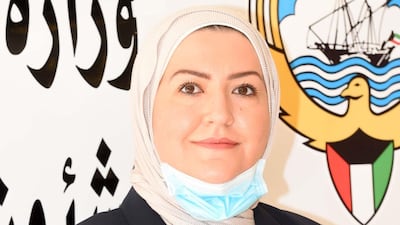A record number of women candidates are running for office in the coming National Assembly elections.
Thirty-three of the 395 candidates are women. They will be competing for 50 of the parliament's 65 seats across five constituencies.
The last National Assembly, which concluded in September, had only one female parliamentarian. In 2016, 15 women ran, but only Safa Al Hashem emerged victorious.
It was Ms Al Hashem's third parliamentary victory, constituting a record among the limited ranks of women who have served as members of parliament.
The increased numbers of female participation are a positive step for Kuwait, which only allowed women to vote 15 years ago.
"The parliament only passed women's suffrage in 2005, after turning down an Emiri Decree in 1999 that granted women's suffrage," said Bader Mousa Al Saif, assistant professor of history at Kuwait University.
"The number of women running in the 2013 and the 2016 elections, if you combine them, they don't even reach 33 candidates." Dr Al Saif said.
Candidate registration for the 2020 election ended on November 4, with the elections scheduled to take place on December 5.
Dr Bibi Ashour, a social policy specialist and secretary of Kuwait Society for National Fraternity, is one of the 33. She said it was the right time for her to run.
"After years of researching and writing about public policies, both as part of my studies and in preparation for a more political role, I felt I was ready to represent Kuwaiti women and women's social challenges as a whole," said Dr Ashour.
"Many of the public policies and laws in Kuwait do not take into account the female perspective, or factor in the challenges women face in their daily lives."
Voter participation has been growing in Kuwait. The last National Assembly election in 2016 saw a 70 per cent turnout among 483,000 registered voters.
This year, there are 567,694 registered voters. But there has been a decrease in candidate registration from 2016, where 440 people stood for office.
This will be the first election to be held in Kuwaiti history without Sheikh Sabah, who died on September 29. Sunday marks the end of the 40-day mourning period.
It is also the first election to be held after the National Assembly successfully completed a full term without dissolution by the ruler since 2003.
"Kuwait had the first constitution in the region in 1962 and with it, the first elections in 1963," Mr Al Saif said. "This is a different election yet, it's also similar. There are strands of continuity and change - the whole aspect of the change of the ruler with the passing of Sheikh Sabah."
Many nations have grappled with how to conduct an election during a pandemic. Low turnout in Jordan and other nations has raised concern that Kuwait could witness a decline in voter attendance due to the fears of maintaining social distancing and risk of being exposed to the virus.

Kuwaitis will see their votes counted by the Single Non-Transferable Vote System, which it has been in place since 2012, when the late Sheikh Sabah issued an Emiri decree to change the electoral system from a four-voting system to a single non-transferable vote.
The system is controversial because some feel that the current voting system is strengthening tribalism and voting according to family loyalties.
Kuwaitis can only vote for one representative out of 10 allotted seats for the district, so they end up voting for a tribe member or someone from their district, rather than on merit, or a number of people (bloc) who can collectively execute their duties as public servants more efficiently.
"In the past, when you have four candidates, you can really lobby, they can build blocs in parliament this way. It's a very personal relationship between you and the candidates, and it makes them work together, maybe a bit harder." Dr Al Saif said.
As such, there has been a large boycott movement and an increased demand for electoral reform, paving the way to challenge the one-vote system once again, as there have been previous submissions of draft laws calling for the voting system to change.


